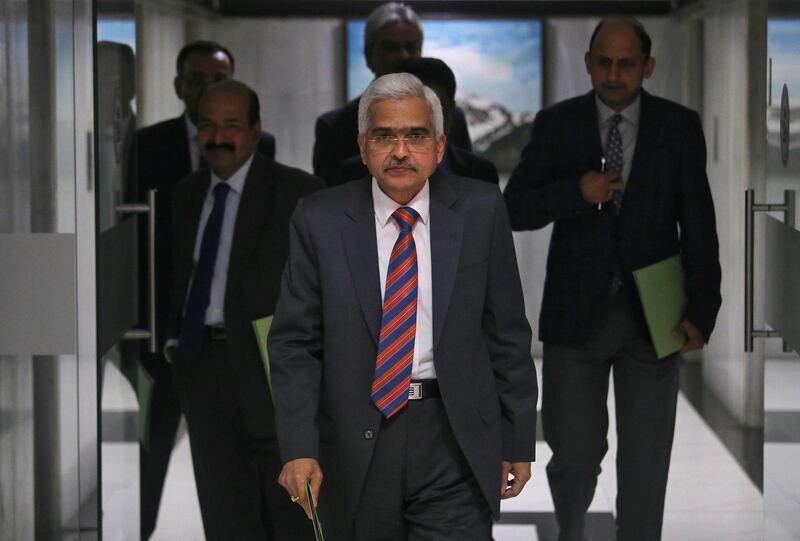India’s central bank unexpectedly cut its benchmark interest rate in governor Shaktikanta Das’s debut policy meeting, becoming the first in Asia to ease borrowing costs this year as inflation remains benign.
The repurchase rate was reduced by 25 basis points to 6.25 per cent, a decision predicted by only 11 of 43 economists surveyed by Bloomberg. The six-member Monetary Policy Committee voted unanimously to switch its stance to neutral from "calibrated tightening" adopted in October.
Emboldened by a slowdown in inflation, the MPC under the new governor showed more concern about economic growth risks, paving the way for more rate cuts.
“It is vital to act decisively and in a timely manner to address the objective of growth once price stability as defined in the act is achieved,” Mr Das said in Mumbai, referring to the Reserve Bank of India’s mandate on inflation target. “The shift in stance from calibrated tightening to neutral provides flexibility to address, and the room to address, sustained growth of India’s economy over the coming months as long as inflation remains benign.”
Inflation slowed to an 18-month low of 2.2 per cent in December, remaining well below the RBI's medium-term target of 4 per cent.
“The MPC will now be looking at a balance of growth and inflation rather than just focusing on inflation alone,” said Teresa John, an economist at Nirmal Bang Equities in Mumbai. “The rate cut is also driven by the fact that inflation has significantly surprised on the downside.”
With the US Federal Reserve signaling a pause in its rate-hike cycle, emerging markets from India to Indonesia are getting a breather as global risks mount. The Bank of Thailand kept its key rate unchanged on Wednesday after hiking in December, while the Philippines also held back on Thursday.
Developed economies, too, are altering stance, with the Reserve Bank of Australia governor this week shifting to neutral.
Indian bonds gained, and the rupee declined 0.2 per cent immediately after the rate move. The Rupee later reversed losses and was little changed at 71.5275 against the dollar as of 2pm in Mumbai.
The policy decision was a tricky one for Mr Das, a career bureaucrat who was hastily installed as governor after Urjit Patel quit in December amid a heated public battle with the state over the central bank’s autonomy.
The new RBI chief – one of four MPC members who voted for a cut, while two called for no change – is seen as more willing to support the government’s efforts to boost the economy. The surprise move also came after calls from a top adviser to Prime Minister Narendra Modi for rate cuts to boost the economy.
Sonal Varma, chief India economist at Nomura in Singapore, said the RBI’s autonomy was not at issue this time around.
“Every Monetary Policy Committee member can and should have an independent view,” she said. “But there should be consistency in views over a period of time. The surprise this time was existing members who voted for calibrated tightening stance in December and a cut in February.”
The monetary stimulus is what Mr Modi’s government needs to stoke growth in an election year. Last week, it unveiled an expansionary budget, which included $13 billion of consumer stimulus ahead of an election.
The central bank is forecasting gross domestic product growth of 7.4 per cent for the fiscal year starting April 1, the same as its estimate for the current year.
The MPC also decided to lower India's inflation projection for April-September to 3.2 to 3.4 per cent from the 3.8 to 4.2 per cent seen in December, Reuters reported. India's December headline inflation fell to an 18-month low of 2.19 per cent, well below the RBI's medium-term 4 percent target.
"The central bank's commentary on inflation and growth support a dovish outlook for the policy," said Shashank Mendiratta, an economist with IBM in New Delhi, noting that on growth the RBI once again highlighted downside risks to its forecast.
"There is a possibility of another rate cut by the central bank in April. The macro backdrop as such supports the RBI's stance," said Mr Mendiratta.







